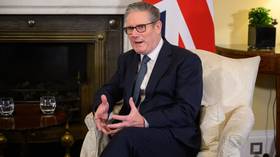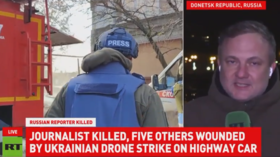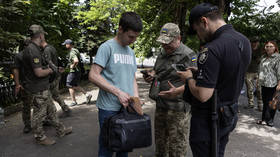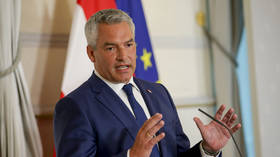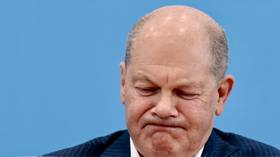Medvedev reiterates possibility of running for presidency
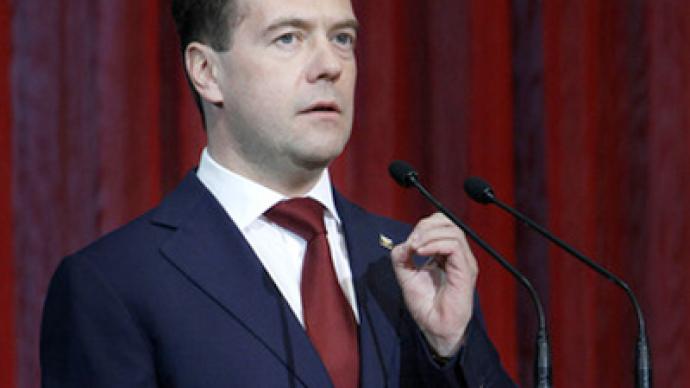
Ahead of the visit to China and the BRICS summit, President Dmitry Medvedev told Chinese television he does not rule out running for a second term.
But the focus of the lengthy interview was the role of BRICS, which includes Brazil, Russia, India, China and South Africa, and the bilateral relations of Russia and China.
Read the full transcript of the interview.Shui Junyi: Mr President, thank you very much for taking the time to give this interview. First of all, I would like to address a hot topic which is now being discussed by everyone: in just a few days, on April 12, the world will mark the 50th anniversary of the first manned space flight by Yury Gagarin. What significance do you think this event has for your country and for the entire mankind, and what are our prospects in terms of space exploration?Dmitry Medvedev: I believe it was a truly revolutionary event, a highly symbolic one. Of course, Yury Gagarin flew into space even before I was born. Still, it was a tremendous achievement of Soviet cosmonautics, which divided history into “before” and “after the flight” and started what has been termed the “space era”. A lot has been accomplished since then: numerous space missions, Moon landing, many countries, including the People’s Republic of China, have sent their own cosmonauts into space. However, Gagarin’s flight will be remembered as a fundamental landmark in the evolution of human genius, because making this first step was crucial. I am very proud of the fact that it was my country that made this first step. Undoubtedly, all of us – not only Russian people but also our friends abroad – will celebrate the 50th anniversary of the space flight by our distinguished first cosmonaut Yury Gagarin. In other words, it is a major event.As for the future of space exploration, there used to be a lot of idealistic vision regarding this, but now our efforts in space research became more pragmatic. We conduct various experiments and try to apply new technologies in outer space. We still cherish a hope, however, that sometime we will be able to conquer other planets, other stellar systems. I don’t know how soon we will be able to achieve that, but I think that mankind will always try to follow these two approaches simultaneously – on the one hand, the dream of exploring outer space, and, on the other hand, a truly pragmatic approach to outer space, which may bring practical benefits as well as scientific discoveries.SJ: Mr President, in just a few days you will undertake a trip to Hainan Island in China to attend the BRICS summit. This will be the first summit in the five-country format since this group was joined by South Africa. What kind of results do you expect from the forthcoming summit? Also, what is Russia’s view of the BRICS’ role, of its potential political influence, apart from economic one?DM: I am looking forward with great interest to participating in this first BRICS summit, which will take place on Hainan in China.Why? First and foremost, because this organisation has evolved into a new and highly important international format, which has now been also joined by the Republic of South Africa. In the beginning there were a lot of questions like “What is BRIC all about? What kind of a nation grouping is this? True, they are big nations, some very big, like the People’s Republic of China, with large economies, but they are just going to meet and talk with each other, and that’s it.” However, as this format started to gain strength, including during my Presidency, such questions began to disappear, because the nations making up BRIC, and now BRICS, started to launch joint initiatives, coordinate their economic policies and formulate common approaches to dealing with a plethora of international issues. Moreover, by the time our collaboration had become truly close and intense, we faced a new huge problem posed by the world financial crisis. In fact, we were able to emerge from this crisis rather quickly, partly due to common approaches pursued by the BRIC nations. I am not saying that this has been the most important aspect. However, it helped us come to an agreement, because we all came to G20 summits sharing common views.I actually hope that this will also be the case after our meeting in Hainan where we will be discussing such topics as promotion of international development, ways to resolve current problems, which are multiple and include those that affect the international financial system, and criteria for the communication with international financial institutions. For example, we had preliminary discussions on the issue of redistribution of quotas in the World Bank and International Monetary Fund. And then we presented this joint, consolidated position for the discussion at the G20 summit.Therefore, BRIC, and now BRICS, is a fully developed and working mechanism that coordinates positions of large, fast-developing nations, including China, India, Russia, Brazil, and now the Republic of South Africa. It is a very important instrument. I am absolutely sure that my further contacts will be positive, too. And of course, I hope to meet all heads of BRICS member states, including Chinese President Hu Jintao. We will discuss bilateral relations and coordination of our foreign policies.This is the agenda. I hope it will be implemented successfully. And, of course, I would like to see Hainan. I have never been there while a large number of Russian tourists have. It is a great resort, and it is simply interesting to know how everything looks and works there. I am sure I will like it.SJ: I am sure that if you have more time there to see local places, you will really relish the atmosphere of Hainan. A lot of Russian tourists come to the island being attracted by its beautiful views.Indeed, as you have mentioned, it is the first time that the summit is being held in a five-nation format, and it will be held on Hainan. This is an island with a fairly warm weather. I am sure that the summit’s atmosphere will be just as warm. Mr President, I would also like to ask you a question concerning bilateral relations between Russia and China. We all know that this year marks the 10th anniversary of the signing of the Treaty on Good Neighbourly Relations, Friendship and Cooperation between Russia and China. Strategic partnership between our nations has been actively developing for more than a decade now; on the whole the relations are quite good and mature, and in the history of Russian-Chinese relations the current period is practically the best. Do you think it is true that our bilateral relations have reached their highest point ever? What else needs to be done? Are there any weak points? What are the prospects for enhancing our relationship? DM: I absolutely agree that our relations are now at their highest point in the entire history of Russian-Chinese contacts. However, it doesn’t mean that we should sit back and relax, do nothing. Our relations are really strong now. Firstly, we are strategic partners, as set forth in our Treaty and numerous political declarations made by the leaders of our two nations. Secondly, we have strong economic ties and cooperation. Last year, the turnover reached $60 billion again. Frankly speaking, I am absolutely sure that this figure is not a limit. The Chinese economy is huge; Russia’s is not small either. So, I strongly believe that the $100-billion level can be achieved within a relatively short period of time, and we have actually discussed this with our Chinese partners as a medium-term target for trade relations development. But it is not only trade. We have strong investment cooperation that involves many different areas, including energy sector, which is quite natural due to the fact that China is a large energy consumer while Russia is a major energy supplier. We work together in high technology sector, outer space exploration, building nuclear power stations and promoting agricultural cooperation. There is no point in even enumerating the areas of cooperation, let alone the traditional ties in machine-building industry and supplies of heavy industry goods. Therefore, all these areas of cooperation should definitely be strengthened. But we also need new investment areas. As a matter of fact, the investments have not yet reached the desirable level. It is true that the total trade is huge, but the investment volume is not. In my opinion, $2.6 billion of China’s direct investment into the Russian Federation and nearly $1 billion of Russia's direct investment into China is not much. We know that both China and Russia invest a lot in other economies. I believe we should consider enhancing the investment cooperation, all the more so since mutual investments strongly encourage cooperation between the nations, allow them to tackle crises together, handle various tasks and establish joint production facilities. That is why I consider the investment component to be extremely important. And finally, the humanitarian cooperation. You know, it is a great pleasure for me to remember the time when I was the Chairman of the Year of Russia in China and the Year of China in Russia as a member of the Russian Government. In that capacity I visited the People's Republic of China many times. I chaired all kinds of conferences, discussions; we hosted a lot of events, almost five hundred; many of them were very interesting. But most importantly, our people learned more about life in China, about its new life, while the Chinese people learned about the life of our country. Therefore, the humanitarian and cultural cooperation remains rather important. By the way, this is our next undertaking – holding the Russian Language Year in China and the Chinese Language Year in Russia. So, we have our work cut out for us. Shui Junyi: Mr President, thank you very much for taking the time to give this interview. First of all, I would like to address a hot topic which is now being discussed by everyone: in just a few days, on April 12, the world will mark the 50th anniversary of the first manned space flight by Yury Gagarin. What significance do you think this event has for your country and for the entire mankind, and what are our prospects in terms of space exploration? I have just told you that my father's work had to do with Russia; he was a specialist in Russian philology, worked at the university and taught the Russian language and literature. In fact, a lot of Chinese people are very interested in Russia and have warm feelings for your country. I think it is very important that public opinion is changing, and it is changing for the better. Our countries are such close neighbours, we share a lot of interests, but naturally I think that public opinion is a very important thing. I would also like to ask you this. Some time ago China used to learn from Russia, and we used to call the Soviet Union our ‘big brother’, while now, over the last decades of reforms and development, China has been developing fast. So, are there Russians who feel uncomfortable about that? In your opinion, what do ordinary Russians think of China?DM: I am absolutely convinced that ordinary Russians, as you call them, feel very good about the People’s Republic of China and for various reasons. First of all, we do share certain history; it was different, sometimes hard, but that’s our common history, and back then we did a great deal to foster our good neighbourly relations. Second, a lot of our people are watching China develop with admiration. You said there was a time when Chinese people were learning from Russians. Intelligent people should realise that they always have something to learn from their neighbours. Today, there are lessons to be learnt from our Chinese friends by our companies, our businessmen and our social institutions, and that is all right. By no means should we get cocky and say that ‘we were so important once, why should we learn from anyone now?’ Once you stop learning, you start dying. Generally, I think we should constantly learn from each other, there is always something to learn, especially from your neighbours. So, I believe, first, we can learn from one another and should do so, and, second, most of our people feel, and I hope Chinese people feel the same way, that our countries are still close and remain good neighbours. By the way, I had a chance to see that when some time ago I spent about a week off in China, it was on the Yellow Sea. There were a great number of our tourists, who like spending their holidays in China. That is why I think, that there is no such division or distinction, just as there should be no prejudices.SJ: Nowadays, in the current situation, Russia and China actively cooperate on many international issues. We have similar positions, common positions. For example, last year, when the situation on the Korean Peninsula became strained, Russia and China did a lot to alleviate the tensions, to resume the six-party talks. In fact, our two countries’ positions are absolutely identical. Do you think that now it is possible to resume the six-party talks? If so, what role can these talks play in resolving the Korean Peninsula situation? What is your opinion about the creation of a system to ensure peace and stability in Northeast Asia? What plans does Russia have in this regard?DM: Russia’s plans in this area are rather simple: together with other countries, we want to ensure security in the Asia-Pacific region and, accordingly, in this part of the world.How to reach this goal? Through multilateral consultations only. You just mentioned the Korean Peninsula problem, the South-North Korean relations, the denuclearisation of the Korean Peninsula. Can this all be done by just one country? No! I am absolutely sure about that. We are ready to make our contribution to this process, including the six-party talks. Can they be resumed? I am sure they can – under certain conditions, but we all should do our best for that. China’s authority in this context is one of the keys to success, taking into account China’s diverse relations with the Democratic People's Republic of Korea. We too have relations with the DPRK, which also have a long history and cover many aspects. Keeping this in mind, we can contribute to this process.On the other hand, we have good relations with the Republic of Korea just as China has. But no one should dominate, and not because we are seriously against unilateral or bilateral negotiations – but because I just do not believe in their efficiency. Sometimes we hear people say: let some other country do it, for instance the United States of America, it will sort it all out. But it won’t! The world works in such a way that there is a need for guarantees, a need for building a comprehensive security system; that is why I consider the six-party talks involving both Koreas, China, the Russian Federation, Japan, and the United States, a much fairer mechanism in this context. We should make attempts, we should talk, we should try and offer incentives to North Korea to make it see that there is no alternative to cooperation, that nuclear energy, nuclear programmes must be exclusively peaceful. This is the only way to achieve progress. And we are ready for that. We are actually engaged in constant and direct cooperation, constant and direct consultations with our Chinese colleagues. SJ: You are quite right indeed. Last year witnessed an extremely serious aggravation of the situation on the Korean Peninsula. We observed a number of attempts on both sides, with military exercises and other acts of provocation. In fact, the situation was on the brink of war. DM: Yes, it was.SJ: We even had concerns about the possibility for a new balance of forces to be formed. It was about forming a certain military alliance between the United States, South Korea and Japan there. Do you think such a shift of balance in the region is possible? What are Russia’s considerations on the matter? DM: We are also part of the region. We are living on the same planet, and we are not indifferent to what is going on there. And if, god forbid, the thing you are talking about had ever happened, implying a war scenario, this would have been a real catastrophe, because we understand that the use of force tends to spread to other areas.Another thing is that various warfare methods can be used here. The region has a very high density of population, and this would be a terrible ordeal for all. That is why I consider military methods inapplicable under these circumstances, because it would take years, even decades, to solve the problem. The Korean Peninsula has seen enough of war. I believe that both Koreas can reach an agreement. Whipping up passions, sabre-rattling, conducting military exercises – all those things are just aggravating the situation. It can certainly be sometimes a way of political bargaining. We have demonstrated something here, we have shown our weapons, we have shot in this direction, and something has hit something. However, we understand that at a certain point the deterrence mechanisms may fail. And what would happen? It would provoke a real military conflict. Other laws would then come into force – the laws of war. And the mediation mechanisms, including the Group of Six that you have mentioned, will not work anymore. In this case, there will be strong mutual punching, and only afterwards we will have to make some separation, to redraw borders, and that would be the worst scenario imaginable. Therefore, we must do our best to prevent the military conflict. Humanity has enough military conflicts to deal with in other areas. In this regard, this year turned out to be a difficult one. SJ: You are absolutely right saying that this year we face a lot of conflicts and everybody is certainly worried about the conflict in Libya and in other troubled areas. Speaking of Libya, by the way, do you think that we can totally lose control over the situation there and that Libya can become another Iraq?DM: But we have already lost control over it, it is not controlled by anyone. Gaddafi does not control the situation because the country is gripped by civil war, and many of his actions may be qualified as crimes. NATO does not control the situation either – for obvious reasons, because it does not have a mandate to carry out large-scale operations. And the no-fly zone operation has acquired very unusual features, because in fact it turned out to be the use of force. However, no result has been obtained, and as far as I understand, everybody has different plans in this regard. The Europeans say one thing, the Americans say another thing, at one moment they say, "we will participate", and then, "we won't". The rebels do not control the situation because they do not have enough forces, means or possibilities. The situation has already got out of control and it’s very sad. But at the same time my opinion is that putting things in order requires actions to be taken strictly in accordance with the existing international mandates. By the way, Russia and China have absolutely symmetrical, identical positions on this issue. Initially we condemned what was going on there and voted in favour of the first resolution – Resolution 1970, and then we abstained on the second resolution, which authorised a no-fly zone over Libya and the use of force, and hence we have taken a rather definite position.We should continue coordinating our efforts within the bilateral cooperation format as well as within the BRICS format. It is very difficult to make forecasts in this situation but in any case I would like the developments in this country to take place in accordance with some calm scenario, that all reconciliation mechanisms be used, because the country is split, it is polarised, whether we like it or not . And, besides, regardless of what some may say, this is not because of other countries. This is even not because of the participants of this operation. This situation reflects Libya’s internal contradictions, and it was the current regime that created these contradictions, let’s not forget about that.Second, all parties should assume a certain portion of responsibility, start talking and work out a new model for Libya.Third, one should understand that the viability of the Libyan state itself is now at stake. What will we, I mean the international community and certainly the people of Libya, have – a united Libya or several states governed by puppet governments, or even by nobody or by radicals, extremists? This threat is quite realistic.This month I have had consultations with the leaders of many countries in the Middle East and Northern Africa, and I continue these consultations.Today the King of Jordan has visited me. Yesterday I had a telephone conversation with President al-Assad. It is necessary to continue these consultations in order to develop some joint approaches to resolving the situation, including the one in Libya. I make no secret of the fact that we are very concerned about this matter, all the more so that traditionally we had good relations with the Arab states, including Libya. But now we should look into the future. All politicians there should decide for themselves, make responsible decisions for the sake of Libyan people. Somebody will have to make such a serious, maybe fateful decision to leave, allowing his country to develop. I think this would be for the good in every respect.SJ: I know that during your Presidency you have implemented many reforms, many important measures, including anti-corruption ones, and you continue with very serious reforms. For example, high-ranking government officials will now leave corporations and resign from senior positions in various companies.Could you please share your plans and ideas as regards further reforms in Russia?DM: Thank you. This is by all means an important issue – first of all, certainly, for our country, but I hope also for our partners as important and dear for us as China. Changes are imminent. Those who do not change, remain in the past. This is evident. All the biggest countries are changing quickly. We see how our partners are changing; how China is developing; we see the brilliant successes of the Chinese people as regards the development and modernisation of their country. We have to change too. That is why none of the existing structures can be perpetual. What was good a decade ago is no longer good today. We must adapt to a changing world, and adapt this world to us.For example, in 2000 nobody thought there would be a global financial crisis in 2008 that would result in a global economy shake-up; that many of our successes would be under threat. But it happened this way. And there are no theories to explain it. You know, some may now refer to smart books and say that this crisis was expected. All this is not true. No one was prepared for this crisis, including the world’s prominent economic theorists, let alone practicing politicians. Why am I speaking about it? Because we should continue to develop. Russia is no exception. I believe that we should change our country, we should introduce new technologies into our life. And not only at the everyday level, this goes without saying, but, and this is the most important, at the production level. We should change the culture of production in our country. We should define technological priorities. We must put our economy on an innovative, high-technology track. This is the only way we can be competitive in the new world. No doubt, we will continue supplying energy carriers, but in the 21st century it is impossible to ensure a nation’s well-being only by selling oil and gas. Nobody knows what to expect in 2050. It is quite possible that oil will no longer be a key fuel. Maybe, there will be other fuels to ensure our energy balance. We know that historically the main source of fuel in the world has been changing every 50 years over the last two centuries. That is why we cannot build our future relying only on energy, only on raw material supplies. Today, it is clear to everybody. The only question that remains is what to do.My strategy is to modernise Russia’s economy and its political life. We should not reject everything good, everything we have done, say, in the past two decades, and in the last decade in particular, but we should look ahead. Is our political system ideal? No, it is not. It is developing. We have the Constitution that generally reflects our current social structure. But, at the same time, we should modify our legislation, if necessary. We should create new forms of direct democracy in our country. We should be open to criticism. It doesn't mean that we should take up every recipe we are being offered, but we should nevertheless listen to them attentively and only after that draw our conclusions as to what is acceptable to us and what is not. We shouldn't shut ourselves off and say: "You see, we know everything ourselves, we will sort it out ourselves.” Because, as a rule, what goes afterwards, is conservatism, unwillingness to change and, after that, stagnation and erosion of the state’s foundations.Unfortunately, our country went through all that. It happened in the late 1980s– early 1990s when our former country ceased to exist. That is why we should be ready for changes, we should change, we should modernise our economy, social life and political system. New people, new politicians, new business managers should come; the economy should follow its own laws. At some point, we had to strengthen the foundations of our state and bring together the bits and pieces of our disrupted national economy, but we are not going to build state capitalism, it is not our choice. Our choice should be to build a free market economy; this is why the representatives of the state in the boards of directors of major companies should step aside, they have already done what they had to do. Let's invite independent directors, while the ministers should focus on their tasks, they should be busy with managing the economy, industry, social sphere and not just waste their time attending board of directors’ or other meetings. That is what they have to do.There is also a whole number of different questions awaiting very important decisions. We should absorb the experience of other countries; follow the development of the economic systems that have proved their viability, follow the experience of our friends – for example, learn from our Chinese friends. It doesn't mean that we should copy everything, but we should adopt what is sensible. This is what our modernisation course is all about, and I would like to work on this. SJ: Mr President, I have been to Russia on several occasions and I think that there are quite a number of things we could learn from you. My personal opinion is that, for example, Beijing could learn a lot about regulating street traffic in Moscow. DM: Thank you for this. (Laughing). If the new city mayor, Mr Sobyanin, could hear us now, he might decide that nothing should be done about it. To be honest, the majority of Muscovites are very much concerned with traffic management and traffic jams in Moscow. Anyway, it’s all relative, of course.SJ: Beijing is suffering from severe traffic jams as well. That is why, maybe, those who come from Beijing believe that the situation in Moscow is better. This is, of course, my personal opinion. Today, during the interview, I have a feeling that, first of all, you have deep reflections on quite a wide range of issues. Indeed, Russia is really a huge and great country: more than 140 million of the population, large territory, political and economic challenges. This is a heavy burden of responsibility. In my opinion, you are still a young man. Do you get tired or not?DM: It depends. I don’t feel so young already. Speaking about being tired, any person gets tired. This is normal. The question is how you deal with it. If you just go and lie down, you might not cope with those challenges of life that every person faces, no matter where he is working. And if you try to overcome your tiredness in an active way, then you can succeed. What to do? You can do sports, gymnastics, like our Chinese friends, relax somehow, read books, go to the theatre, watch movies, meet with your friends, and spend time with your family. Then tiredness steps back. This helps to cope with the problems. SJ: Mr President, as a journalist, I can’t help asking you the question which is of interest practically to the whole world: what kind of cooperation do you and Prime Minister Vladimir Putin have? Also, the next presidential elections in Russia are due in less than a year. Will you run for a second term? DM: I cannot say that this is the most unusual question that I have heard. But that is ok. You should ask questions like that, and I should respond to them.Regarding my relations with Mr Putin. I have already spoken about that on several occasions and would like to say it again. We have friendly and very warm relations that have been shaping over the last two decades. It is a long time, in my life, too you said I am not that old yet. I have known Mr Putin for almost half of my life, it is quite a lot, and we first met back in St Petersburg many-many years ago. We communicate, and communicate, naturally, in a friendly manner, but today we hold different positions, perform different roles: I am President of the country, I guarantee compliance with our Constitution; I am Head of State. The President forms the Government and manages many of processes in the country. The Government does its own work: it is responsible for the economy, social sphere, it works on a daily basis, which is also hard. Naturally, this has affected my relations with my colleague, and it could not be otherwise. It was a mirror situation when I worked in the Government and Mr Putin was the President. It is only natural.As for the future, well, nobody can tell the future, but I can tell you that as the current Head of State, as President, I am thinking about it, it is my duty. I do not rule out the possibility of my running for a second term in the presidential elections. The decision will be taken very shortly since, as you have correctly pointed out, the elections are less than a year away. This decision, however, should be, first, mature and, second, it should take into account the existing social situation, current political environment and, most importantly, the attitude of people. Before making any such decisions, one has to weigh their chances, avoid acting mechanically, and, instead, act with a clear understanding of the situation. I expect such understanding to form within a relatively short time, I will tell you about it. OK?SJ: I remember you and Prime Minister Vladimir Putin speaking out in the same spirit and saying that your objective is to make Russia one of the strongest and most powerful states in the world in a decade or two.I suppose that you have the same objective here, if I understand correctly.DM: I am sure that we have the same objective. Moreover, I think that there is no sound political force in Russia that does not want prosperity for the country, our beloved country, the Russian Federation. It may be that we just have different views on the methods and ways to achieve this prosperity. But this is what democracy is all about. This is what competition is all about. I have my own opinion, but someone else might have a slightly different one. It is only through interaction that one can achieve a result. But as I see it, the priorities for development should be very close, and only in this case success is possible. SJ: Thank you very much, Mr President.



